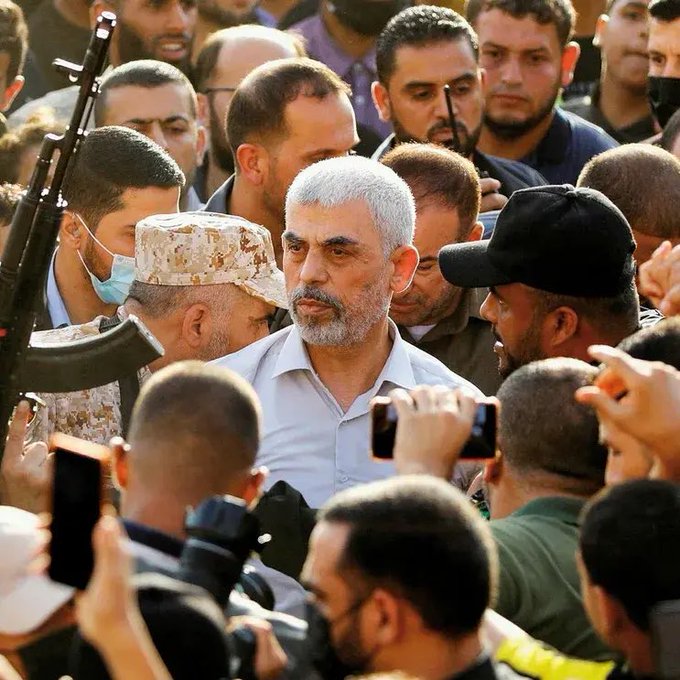The Israeli military has announced that it is investigating the potential death of Yahya Sinwar, a prominent leader of Hamas, following an operation in the Gaza Strip. Sinwar has been at the forefront of Hamas’s military strategies, notably orchestrating the October 7, 2023, attack on Israel, which marked a significant escalation in the long-standing conflict.

Operation Details
On October 17, 2024, the Israel Defense Forces (IDF) reported that three militants were killed during a targeted operation in Rafah, a city in the southern Gaza Strip. The military is currently assessing whether one of these individuals is Yahya Sinwar. While the identities of the deceased militants have not yet been confirmed, the IDF emphasized that there were no indications that Israeli hostages were present at the site of the operation.
Israeli officials have expressed cautious optimism about the potential impact of Sinwar’s death. If confirmed, this would be a significant victory for the Israeli military, particularly for Prime Minister Benjamin Netanyahu, who has faced criticism for his handling of the ongoing conflict.

Yahya Sinwar: The Architect of Violence
Yahya Sinwar, often referred to as the “Butcher of Khan Younis,” has a notorious reputation within and outside Gaza. Born in 1962, Sinwar has played a crucial role in shaping Hamas’s military and political strategies since the organization’s inception in 1987. His leadership has been marked by a ruthless approach toward perceived enemies, including fellow Palestinians suspected of collaboration with Israel.
Sinwar spent over 20 years in Israeli prisons after being convicted of the murder of two Israeli soldiers and several suspected informants. He was released in 2011 as part of a prisoner exchange deal for Israeli soldier Gilad Shalit. After his release, Sinwar quickly ascended the ranks of Hamas, becoming its leader in Gaza in 2017 and taking over as the overall leader after the assassination of former chief Ismail Haniyeh in July 2024.
The October 7 Attack: A Turning Point
The October 7 attack, which resulted in the deaths of approximately 1,200 Israelis and the abduction of more than 250 individuals, was a meticulously planned operation. Sinwar’s strategic vision was integral to the execution of this assault, which involved a combination of military and civilian targets. Reports indicate that the planning began as early as January 2022, with discussions on various operational scenarios, including a high-profile attack on major Israeli landmarks.
The attack not only shocked Israel but also drew international condemnation and intensified the conflict in Gaza, leading to widespread destruction and significant loss of life on both sides.
Reactions to Potential Death
Israeli officials reacted strongly to the news of Sinwar’s possible death. Defense Minister Yoav Gallant invoked biblical verses in a statement, emphasizing Israel’s commitment to pursuing its enemies relentlessly. He shared images of other targeted leaders, such as Hassan Nasrallah of Hezbollah, signaling a continued focus on eliminating threats to Israeli security.
Public sentiment in Israel has largely leaned toward viewing Sinwar’s potential demise as a moment for celebration. Former government spokesperson Eylon Levy remarked that Sinwar might be regretting his actions as he faces the consequences in death. Furthermore, the Hostages Families Forum welcomed the news while simultaneously calling for renewed efforts to secure the release of those still held captive by Hamas.
Broader Implications for Hamas
Sinwar’s leadership has brought both resilience and turmoil to Hamas. Under his direction, the group has sought to strengthen its military capabilities while maintaining control over Gaza. His death could lead to a power vacuum within the organization, potentially destabilizing Hamas further. However, it could also incite retaliation from militants who view him as a martyr, potentially escalating violence in the region.
Despite Sinwar’s role as a key figure in orchestrating attacks against Israel, his leadership also involved maintaining complicated relationships with allies, including Iran. His requests for military and financial support from Tehran illustrate the interconnected nature of Middle Eastern geopolitics.
Source Via Twitter (X) : Source 1 / Source 2 / Source 3
Conclusion
The potential death of Yahya Sinwar marks a pivotal moment in the ongoing Israeli-Palestinian conflict. If confirmed, it could significantly impact the strategic landscape of Hamas and alter the dynamics of resistance in Gaza. As Israel continues its military operations, the international community watches closely, aware that the consequences of such actions could have far-reaching implications for regional stability. The conflict remains complex, with a long history of animosity and violence that continues to affect millions on both sides.
In the wake of these developments, the urgent need for dialogue and a sustainable resolution becomes increasingly apparent. While military actions may provide temporary victories, lasting peace can only be achieved through understanding and cooperation, addressing the root causes of conflict rather than merely its symptoms.
Key Details:
| Specification | Detail |
|---|---|
| Date of Operation | October 17, 2024 |
| Location | Rafah, Gaza Strip |
| Notable Figure | Yahya Sinwar, Hamas leader |
| Attack Date | October 7, 2023 |
| Casualties (Attack) | 1,200 Israelis killed, 250+ hostages taken |
| Background | Sinwar’s leadership and Hamas’s military role |
| International Impact | Calls for dialogue, ongoing military operations |


